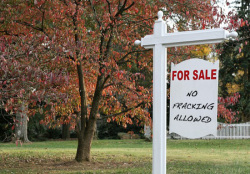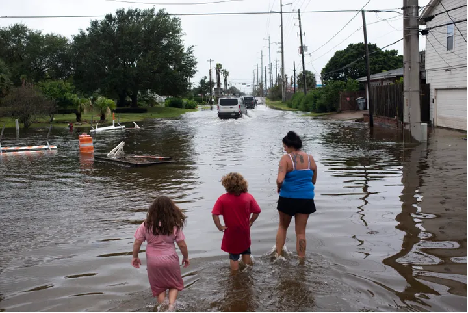NY Imports PA’s Radioactive Fracking Waste
August 16, 2013Fracking Leaves Property Values Tapped Out
August 23, 2013By Roger Drouin, grist, August 16, 2013
 When it comes to the real estate market in Bradford County, Pa., where 62,600 residents live above the Marcellus Shale, nothing is black and white, says Bob Benjamin, a local broker and certified appraiser. There aren’t exactly “fifty shades of grey,” he says, but residential mortgage lending here is an especially murky situation.
When it comes to the real estate market in Bradford County, Pa., where 62,600 residents live above the Marcellus Shale, nothing is black and white, says Bob Benjamin, a local broker and certified appraiser. There aren’t exactly “fifty shades of grey,” he says, but residential mortgage lending here is an especially murky situation.
When Benjamin fills out an appraisal for a lender, he has to note if there is a fracked well or an impoundment lake on or near the property. “I’m having to explain a lot of things when I give the appraisal to the lender,” he says. “They are asking questions about the well quite often.”
And national lenders are becoming more cautious about underwriting mortgages for properties near fracking, even ones they would have routinely financed in the past, Benjamin says.
That’s a real problem in Bradford County, where 93 percent of the acreage is now under lease to a gas company.
Local banks are still lending because they have to if they want the business in the county, according to Benjamin, who has been involved in the area’s real estate market since 1980. But, he says, “The big boys, Wells Fargo and the other banks are probably pretty similar, they are going to protect their butt.”
Lawyers, realtors, public officials, and environmental advocates from Pennsylvania to Arkansas to Colorado are noticing that banks and federal agencies are revisiting their lending policies to account for the potential impact of drilling on property values, and in some cases are refusing to finance property with or even just near drilling activity.
Real estate experts say another problematic trend is that many homeowners insurance policies do not cover residential properties with a gas lease or gas well, yet all mortgage companies require homeowners insurance from their borrowers.
“Well, that is a conflict,” says Greg May, vice president of residential mortgage lending at Ithaca, N.Y.-based Tompkins Trust Company.
Last month, a landowner in Madison, N.Y., was surprised when their insurance company refused to renew their homeowners policy because there is a conventional gas well on their property.
While the media and environmental groups have focused on shale drilling’s potential to poison the soil, water, and air, they’ve largely overlooked its potential to poison the real estate market.
“I think we are on the tip of this,” says Steve Hvozdovich, Marcellus Shale coordinator for Clean Water Action in Pennsylvania. “Whether you are the homeowner trying to get homeowners insurance or the neighbor [to a fracking site] who is trying to refinance, there are just so many tentacles to this. I don’t think people are grasping all the impacts of natural gas drilling.”
Benjamin doesn’t often hear property owners talk about the issue. “I don’t think most are concerned about it,” he says. “But I think they may have to be in the future.”
The first denial
Brian and Amy Smith live across the street from a new gas well in Daisytown in Washington County, Pa….



